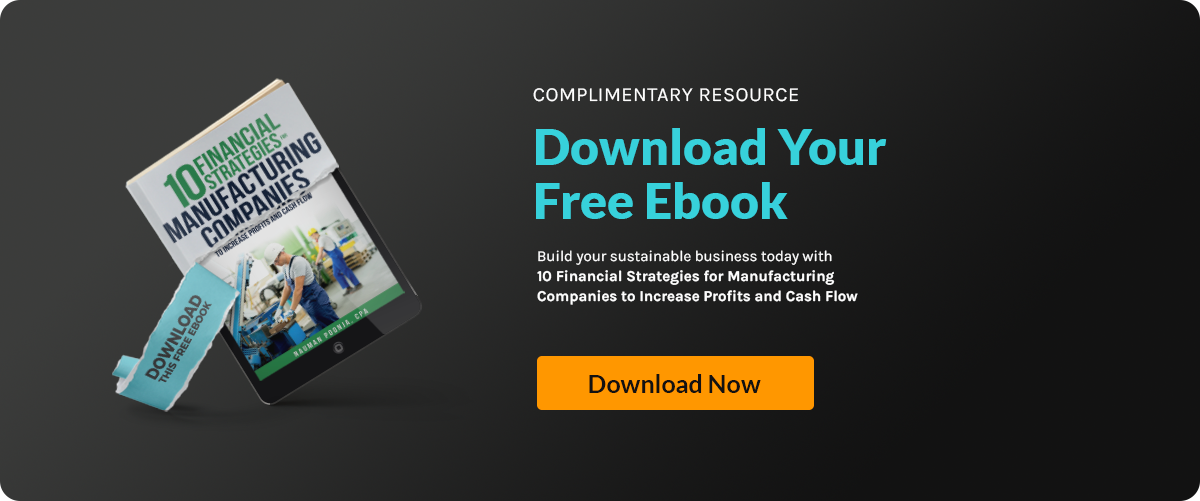Risks abound in manufacturing. Machinery breakdowns, supply chain disruptions, employee injuries,...
Why Work With a CPA Who Specializes in Manufacturing?

Choosing the right Certified Public Accountant (CPA) to support your business is an important decision. Finding a CPA who understands manufacturing business processes and has experience working with manufacturing companies will help you streamline your financial processes. When you look for a CPA for your business, look for someone who can bring a wealth of industry knowledge and experience to the table. Let's talk about why this approach is in the best interest of your company.
What is the role of a CPA in the manufacturing industry?
CPAs specializing in manufacturing play a crucial role in managing financial records for manufacturing companies. They meticulously track financial transactions, ensuring accuracy and compliance with industry regulations. Moreover, they provide tax planning strategies specifically designed for manufacturers to minimize liabilities and maximize R&D credits.
Additionally, manufacturing CPAs offer advisory services on costing and profitability. By looking deep into the financial data, CPAs can identify areas for cost optimization and provide valuable insights on enhancing profitability. The specific industry knowledge they bring to a business allows them to help the business grow faster.
How can a manufacturing CPA help improve your business?
A manufacturing CPA can help improve your business in various ways. First, they focus on tax services by maximizing credits, ensuring that businesses take full advantage of available incentives to reduce their tax burden. Furthermore, CPAs specializing in manufacturing provide enhanced financial analysis and benchmarking, providing valuable insights for better decision-making.
Another key area where a specialized CPA can contribute is in optimizing supply chain and cash flow management. By analyzing cash flow patterns and supply chain operations, CPAs can recommend strategies to improve processes and ensure the smooth flow of financial resources.
Why should manufacturing companies hire a CPA with industry experience?
Manufacturing companies should prioritize hiring CPAs with industry experience due to the specialized knowledge and skills they bring to the table. These CPAs understand the complexities of manufacturing accounting, including the unique challenges and nuances of financial management within manufacturing firms.
Moreover, CPAs with industry experience specialize in tax planning related to the manufacturing sector. They are well-versed in identifying tax-saving opportunities, ultimately helping companies reduce their tax burdens while remaining compliant with regulations.
Furthermore, CPAs with industry experience provide valuable insights into industry-specific financial challenges, offering proactive solutions to address these challenges and drive the company’s future growth.
What are the benefits of working with a manufacturing CPA firm?
Working with a dedicated services team, your CPA can offer several key advantages. One of the key advantages is access to specialized accounting services tailored for manufacturers. These services cater to the unique needs of manufacturing businesses, ensuring that financial processes are aligned with industry standards and best practices.
Additionally, by partnering with a dedicated CPA firm, companies can improve cost efficiency through expert financial advice. CPAs within the firm leverage their industry knowledge and experience to recommend strategies that optimize costs and improve overall financial performance.
Moreover, CPA firms focus on maximizing profitability and minimizing tax liabilities for their clients through strategic R&D credit utilization. By implementing effective tax planning strategies and financial management techniques, these firms help businesses enhance their bottom line and achieve sustainable growth.
How can a manufacturing CPA help with 2024 industry trends and challenges?
CPAs specializing in manufacturing process optimization are well-equipped to help companies navigate emerging industry trends and challenges. These CPAs provide valuable business advisory services on industry-specific regulations and compliance issues, ensuring that businesses stay abreast of changing regulatory requirements.
Moreover, CPAs assist companies in implementing tax strategies to adapt to the evolving manufacturing landscapes of 2024. By staying up-to-date with incentives and regulations, CPAs can help manufacturers optimize their tax planning strategies to remain competitive and financially resilient.
Lastly, CPAs play a crucial role in assisting with financial forecasting and long-term planning. By analyzing industry trends and market conditions, CPAs offer insights that help manufacturers make informed decisions and position their companies for sustainable growth in the years ahead.
Frequently Asked Questions
Why is it beneficial to work with a CPA who has a focus on manufacturing?
Working with a Certified Public Accountant (CPA) who has a focus on manufacturing clients is beneficial because they offer deep industry knowledge and experience. This expertise helps businesses with tailored financial strategies, optimizing operations, and maximizing tax savings, which are crucial for staying competitive.
What specific roles does a CPA play in the manufacturing industry?
A CPA plays several vital roles, including managing financial records with precision, providing industry-specific tax planning to minimize liabilities, and offering advisory financial services for cost optimization and profitability enhancement. Their deep dive into financial data offers actionable insights for businesses.
Why should manufacturing companies prioritize hiring CPAs with industry experience?
Manufacturing companies should prioritize hiring CPAs and accounting teams with industry experience because they bring specialized knowledge that addresses the unique challenges of these particular business types. Their expertise in tax planning and understanding of industry-specific financial issues provide a solid foundation for strategic financial management. This removes inefficiencies and allows the business to operate without disruption, improving its ability to hit financial projections.
How can a manufacturing CPA assist with navigating 2024 industry trends and challenges?
A CPA can assist with 2024 industry trends and challenges by offering advisory services on regulatory compliance, implementing updated tax strategies in response to evolving industry landscapes, and providing insights for financial forecasting and strategic planning to ensure long-term business success.
What tax planning services can a manufacturing CPA provide to maximize tax credits?
A CPA can provide comprehensive tax planning services designed to maximize tax credits available to help manufacturing businesses avoid incurring unnecessary tax burdens. This includes identifying specific incentives, optimizing deductions, and ensuring that businesses fully leverage available credits to minimize their overall burden.
How does financial reporting and analysis by a manufacturing CPA contribute to business growth?
Financial reporting and analysis can contribute to business growth by offering detailed insights into financial performance, identifying areas to perform operationally at higher levels, and supporting strategic decision-making. Accurate financial reports and benchmarking analysis help businesses understand their position and plan for future growth.
Can a manufacturing CPA guide inventory costing and management?
Yes, CPAs can provide expert guidance on inventory costing and management. They can perform customer profitability analysis and optimization. Additionally, they can act as a part of a solutions team by analyzing specific product lines to see how they perform operationally. Their specialized knowledge helps in accurately valuing raw materials and inventory, optimizing inventory levels, and implementing strategies to reduce costs associated with holding and managing inventory, thereby improving operational efficiency.







